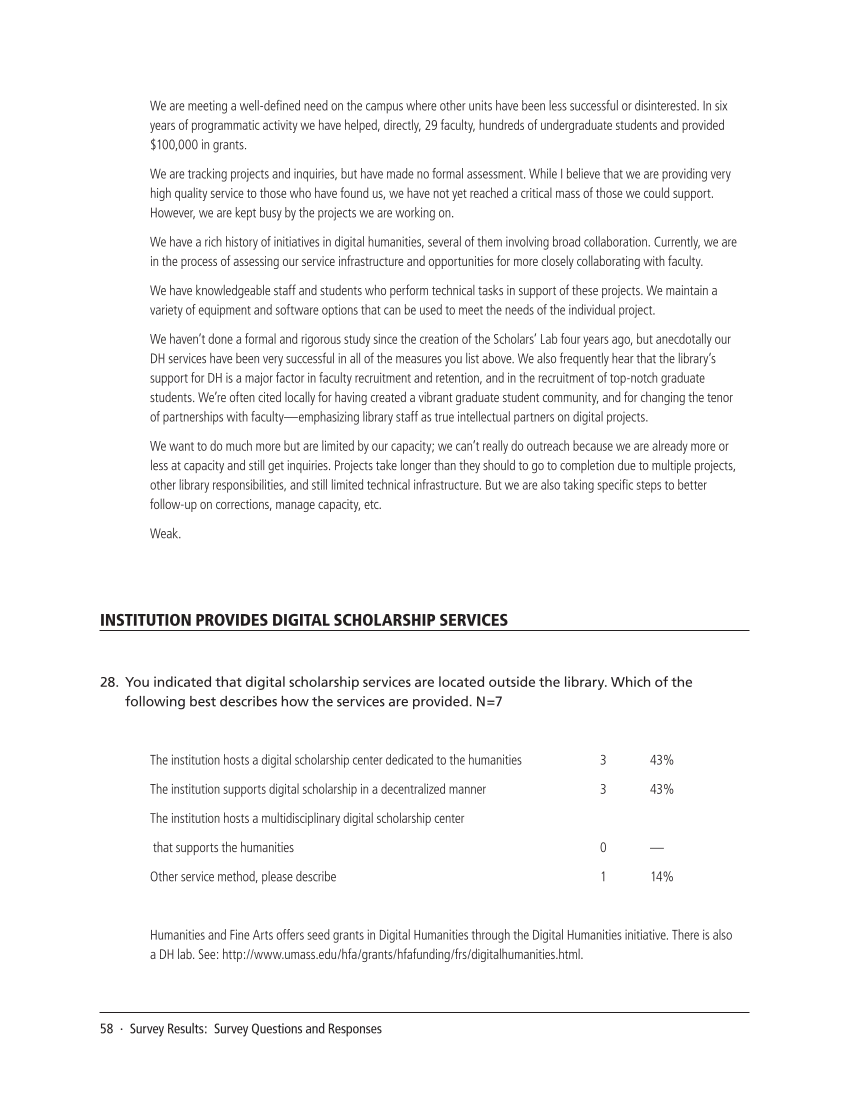58 · Survey Results: Survey Questions and Responses
We are meeting a well-defined need on the campus where other units have been less successful or disinterested. In six
years of programmatic activity we have helped, directly, 29 faculty, hundreds of undergraduate students and provided
$100,000 in grants.
We are tracking projects and inquiries, but have made no formal assessment. While I believe that we are providing very
high quality service to those who have found us, we have not yet reached a critical mass of those we could support.
However, we are kept busy by the projects we are working on.
We have a rich history of initiatives in digital humanities, several of them involving broad collaboration. Currently, we are
in the process of assessing our service infrastructure and opportunities for more closely collaborating with faculty.
We have knowledgeable staff and students who perform technical tasks in support of these projects. We maintain a
variety of equipment and software options that can be used to meet the needs of the individual project.
We haven’t done a formal and rigorous study since the creation of the Scholars’ Lab four years ago, but anecdotally our
DH services have been very successful in all of the measures you list above. We also frequently hear that the library’s
support for DH is a major factor in faculty recruitment and retention, and in the recruitment of top-notch graduate
students. We’re often cited locally for having created a vibrant graduate student community, and for changing the tenor
of partnerships with faculty—emphasizing library staff as true intellectual partners on digital projects.
We want to do much more but are limited by our capacity we can’t really do outreach because we are already more or
less at capacity and still get inquiries. Projects take longer than they should to go to completion due to multiple projects,
other library responsibilities, and still limited technical infrastructure. But we are also taking specific steps to better
follow-up on corrections, manage capacity, etc.
Weak.
Institution Provides Digital Scholarship Services
28. You indicated that digital scholarship services are located outside the library. Which of the
following best describes how the services are provided. N=7
The institution hosts a digital scholarship center dedicated to the humanities 3 43%
The institution supports digital scholarship in a decentralized manner 3 43%
The institution hosts a multidisciplinary digital scholarship center
that supports the humanities 0 —
Other service method, please describe 1 14%
Humanities and Fine Arts offers seed grants in Digital Humanities through the Digital Humanities initiative. There is also
a DH lab. See: http://www.umass.edu/hfa/grants/hfafunding/frs/digitalhumanities.html.
We are meeting a well-defined need on the campus where other units have been less successful or disinterested. In six
years of programmatic activity we have helped, directly, 29 faculty, hundreds of undergraduate students and provided
$100,000 in grants.
We are tracking projects and inquiries, but have made no formal assessment. While I believe that we are providing very
high quality service to those who have found us, we have not yet reached a critical mass of those we could support.
However, we are kept busy by the projects we are working on.
We have a rich history of initiatives in digital humanities, several of them involving broad collaboration. Currently, we are
in the process of assessing our service infrastructure and opportunities for more closely collaborating with faculty.
We have knowledgeable staff and students who perform technical tasks in support of these projects. We maintain a
variety of equipment and software options that can be used to meet the needs of the individual project.
We haven’t done a formal and rigorous study since the creation of the Scholars’ Lab four years ago, but anecdotally our
DH services have been very successful in all of the measures you list above. We also frequently hear that the library’s
support for DH is a major factor in faculty recruitment and retention, and in the recruitment of top-notch graduate
students. We’re often cited locally for having created a vibrant graduate student community, and for changing the tenor
of partnerships with faculty—emphasizing library staff as true intellectual partners on digital projects.
We want to do much more but are limited by our capacity we can’t really do outreach because we are already more or
less at capacity and still get inquiries. Projects take longer than they should to go to completion due to multiple projects,
other library responsibilities, and still limited technical infrastructure. But we are also taking specific steps to better
follow-up on corrections, manage capacity, etc.
Weak.
Institution Provides Digital Scholarship Services
28. You indicated that digital scholarship services are located outside the library. Which of the
following best describes how the services are provided. N=7
The institution hosts a digital scholarship center dedicated to the humanities 3 43%
The institution supports digital scholarship in a decentralized manner 3 43%
The institution hosts a multidisciplinary digital scholarship center
that supports the humanities 0 —
Other service method, please describe 1 14%
Humanities and Fine Arts offers seed grants in Digital Humanities through the Digital Humanities initiative. There is also
a DH lab. See: http://www.umass.edu/hfa/grants/hfafunding/frs/digitalhumanities.html.
































































































































































































